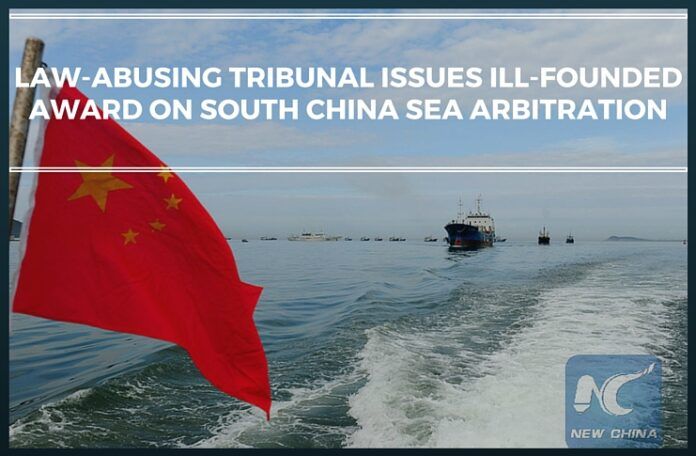
China protest tribunal verdict, questions its jurisdiction
The tribunal handling the South China Sea arbitration unilaterally initiated by the former Philippine government issued its final award on Tuesday, amid a global chorus that the panel has no jurisdiction to do so.
[dropcap color=”#008040″ boxed=”yes” boxed_radius=”8px” class=”” id=””]I[/dropcap]n a press release accompanying the 479-page award, the five-member tribunal offered a summary of its decisions, which sweepingly side with the claims filed by the administration of former Philippine President Benigno S. Aquino III.
Chinese President Xi Jinping, in a meeting with visiting European leaders on Tuesday, said that China will not accept any proposition or action based on the award, and that China’s territorial sovereignty and maritime interests in the South China Sea will under no circumstances be affected by it.
China has refused to participate in the proceedings, reiterating that the tribunal has no jurisdiction over the case, which is in essence related to territorial sovereignty and maritime delimitation.
[dropcap color=”#008040″ boxed=”yes” boxed_radius=”8px” class=”” id=””]T[/dropcap]he Chinese government has pointed out that territorial issues are not subject to the UN Convention on the Law of the Sea (UNCLOS), and that as early as in 2006, China explicitly declared — in line with UNCLOS — exclusion of disputes concerning maritime delimitation from mandatory dispute-settlement procedures, including arbitration without its prior consent. Some 30 countries have also filed declarations of this kind.
“The Ministry of Foreign Affairs of the People’s Republic of China solemnly declares that the award is null and void and has no binding force. China neither accepts nor recognizes it,” the ministry said in a statement shortly after the award was announced.
The ministry also reiterated that “the Chinese government will continue to abide by international law and basic norms governing international relations … and continue to work with states directly concerned to resolve the relevant disputes in the South China Sea through negotiations and consultations on the basis of respecting historical facts and in accordance with international law.”
More than 60 countries and international organizations, as well as over 130 foreign political parties and groups, have voiced support for China’s principled position, far outnumbering those backing the assertions of the Aquino administration and the United States, which is widely considered as a primary instigator behind the arbitration.
The Aquino administration filed the arbitration against China in 2013, despite the agreement his country had reached with China on resolving their disputes in the South China Sea through bilateral negotiations.
[dropcap color=”#008040″ boxed=”yes” boxed_radius=”8px” class=”” id=””]A[/dropcap]lthough Manila asserted that its submissions do not concern territorial sovereignty or maritime delimitation, the Philippine Foreign Ministry, a day after launching the arbitration, described the purpose of the case as to “protect our country’s territory and oceanic area.”
Xu Liping, a senior research fellow with the National Institute of International Strategy at the Chinese Academy of Social Sciences, stressed that UNCLOS should never be allowed to serve as a tool for certain interest groups to decide on sovereignty-related disputes.
“The award, a typically unfair and arbitrary verdict, represents a huge blow to the world’s confidence in the international legal system and the integrity of arbitration proceedings,” he said.
Note:
1.Xinhua
(This story has not been edited by PGurus.com and is auto–generated from a syndicated feed we subscribe to.)
- Pentagon cancels aid to Pakistan over record on militants - September 2, 2018
- The curious case of Tamil Nadu’s opposition to NEET - September 4, 2017
- If 2.6 Billion People Go To War: India vs. China - July 22, 2017







